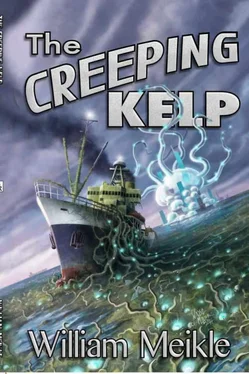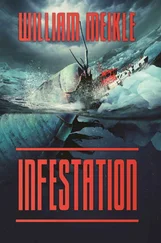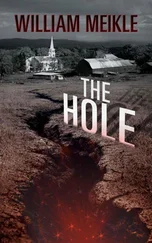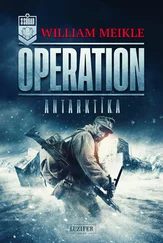Suzie replied first.
“Bugger the radio. We still have the satellite connection in the lab. Hell, we can get anyone we want in seconds online.”
The Skipper shook his head.
“I’m not sending anyone down below. We’ve got no way of knowing if those things are down there.”
Noble hefted the axe.
“I’ll take that chance. We need to get someone out here to rescue us.”
The Skipper hardly noticed as Noble led Suzie off the bridge. When Noble turned for a look back the old man had gone back to staring out of the window, fresh tears running down his cheeks.
As they descended the main stairs to the lab and crew quarters, Noble realised just how quiet the vessel had become. Normally, even when they were at anchor, there was a buzz around the boat, the slap of feet on deck or the sound of three different stereo systems vying for supremacy. Today there was nothing, not even any whistle of wind from outside. The things , whatever they were, seemed to have stopped squeezing for the time being.
I suppose we should be thankful for small mercies.
Suzie refused to let go of his hand all the way to the lab. She jumped once when they passed an exterior door, but it was securely closed, and there was no noise from the other side. When they reached the lab and Noble closed the door behind them, she loosened visibly—not enough to let go of his hand, but enough that it didn’t feel like it had been clamped in a bear trap.
“Over here,” she said, and led him to the desk where the laptop computer sat. It was only then that she let go of his hand. He started to move away, to check on the door, but she grabbed at him like a drowning man after a life belt and pulled him close.
“Please,” she said. “Don’t go far.”
Noble watched as she called up the coastguard in Weymouth. The man at the other end wouldn’t believe her at first. Not until Noble dragged over a Petri dish containing remnants of the tar they’d collected earlier. He held it up to the web-cam. As if on cue it started to ooze and coalesce.
The web-cam looked at the tar.
And the tar looked back.
A single, lidless eye, pale green and milky, stared out from a new fold in the protoplasm. An audible gasp came from the coastguard at the other end.
“Is this some kind of trick?” the man asked. “Because if it is, I’m warning you…”
Suzie had taken enough.
“Listen, arsehole, we’re dying out here. Are you going to help us, or should I call the fucking Royal Navy?”
The man went white, then red. Noble saw him think about blustering, then saw his eyes look again at the Petri dish. The tar obliged by slumping around the confines of the glass, the lidless eye continuing to stare at the webcam.
“Do you have engine power?” the coastguard asked finally, dragging his gaze from the eye.
“No,” Suzie said. By now she was close to shouting. “Just get some help to us. And fast.”
The man left his seat, leaving Suzie and Noble looking at a view of an empty office at the other end.
“Now we wait,” Noble said.
Suzie turned her gaze to the Petri dish. The eye stared back at her.
“What the hell is this stuff, Dave?” she asked softly. “Did we make it?”
He had no answer for her. They both stood there for long seconds, just staring down at the tarry material, watching it seethe and flow.
From outside, a sound broke the quiet—high pitched, like a flock of gulls after a shoal of fish. But it was as if words could be heard in the din—the same words, repeated over and over.
Tekeli Li. Tekeli Li.
Suzie went pale.
“What is it?” Noble said. “What’s wrong?”
Suzie sobbed.
“You mean, what else? ”
She turned back to the laptop, fingers frantically dancing over the keyboard as she searched for information.
“What is it?” Noble asked again, more urgently this time when she hadn’t spoken. She was too busy to reply. After several minutes she finally sat back in her chair.
“It can’t be,” she whispered. “That’s just a story.”
“Suzie,” he said softly. “Just tell me. Please?”
She pointed at the screen.
“Remember last year, I went on the survey to Antarctica?” She didn’t pause for an answer. “We sat up late one night, as you do, drinking rum and telling stories. Talk got around to the Pabodie Expedition in the early thirties.”
“Wasn’t there some kind of mass delusion on that one?”
Her eyes were wide. “So everyone thought at the time. But there’s a story going ‘round that they discovered an ancient city under the ice—a city built by beings genetically engineered for the purpose. These beings are said to be able to take any shape required to get the job done… and at least one of the beings the Expedition found was still alive. They called it a Shoggoth. ”
Noble barked out a laugh.
“Cabin fever and too much booze, more like.”
Suzie looked back at the laptop. She looked genuinely worried.
“But what if it was more than that? Does this sound familiar? This is an extract from a journal of one of the expedition members.”
She read from the screen.
“It was a terrible, indescribable thing, bigger than any subway train—a shapeless congeries of protoplasmic bubbles, faintly self-luminous, and with a myriad of temporary eyes forming as pustules of greenish light all over the tunnel-filling mass that bore down upon us… slithering over the glistening floor, that it and its kind, had swept so evilly free of all litter. Still came that eldritch, mocking cry—
Tekeli Li. Tekeli Li.
“Don’t you see,” Suzie said. “It’s the same—the eyes… and the chanting.”
Noble leaned over her and read the words for himself.
“That’s just a story to frighten the gullible,” he said, trying to convince himself, more than anything else. Outside, the noise grew louder, the sound ringing all around the ship.
Tekeli Li. Tekeli Li.
The protoplasm in the Petri dish suddenly surged against the glass, with such force that the dish fell off the table. The tarry substance started to make its way across the floor, scuttling like a manic spider. Before Noble could stop her, Suzie rushed to the trestle and poured some of the contents of a glass jar on the creature. Steam rose. A vinegar-like tang caught at the back of Noble’s throat and forced him to close his eyes, firmly. When he looked again, there was nothing left of the creature but a smoking pool of oily goop on the floor.
“What did you use?” Noble asked, aware that he’d just been shown a weapon a bit more devastating than the fire-axe.
“Hydrochloric acid,” she replied. “We can kill it.”
Noble remembered the scene out of the bridge window, the forest of swaying tendrils.
“I don’t think we’ve got enough,” he replied quietly. He turned back to the screen.
“Okay, for the sake of argument, say what we have here is a Shoggoth from the Antarctic. Why here? Why now?”
Suzie shrugged.
“We may never know… not without more study. But I suspect there are at least two driving factors. One is global warming. The ice-shelves have been disintegrating for years now. Maybe one woke from freezing and hitched a ride?”
He had to admit, it was possible, if not exactly probable.
“What’s the other thing?”
“What every creature needs. A food source. If the stories are true, these things are bio-engineered, made of complex hydrocarbons. Other complex hydrocarbons, and lots of them, would be irresistible to such a beast.”
“But why would…”
Noble never got a chance to finish.
The boat lurched. Metal squealed. Even through the door of the lab they heard screams, wild and full of fear, coming from the direction of the bridge house. Noble ran for the door.
Читать дальше












